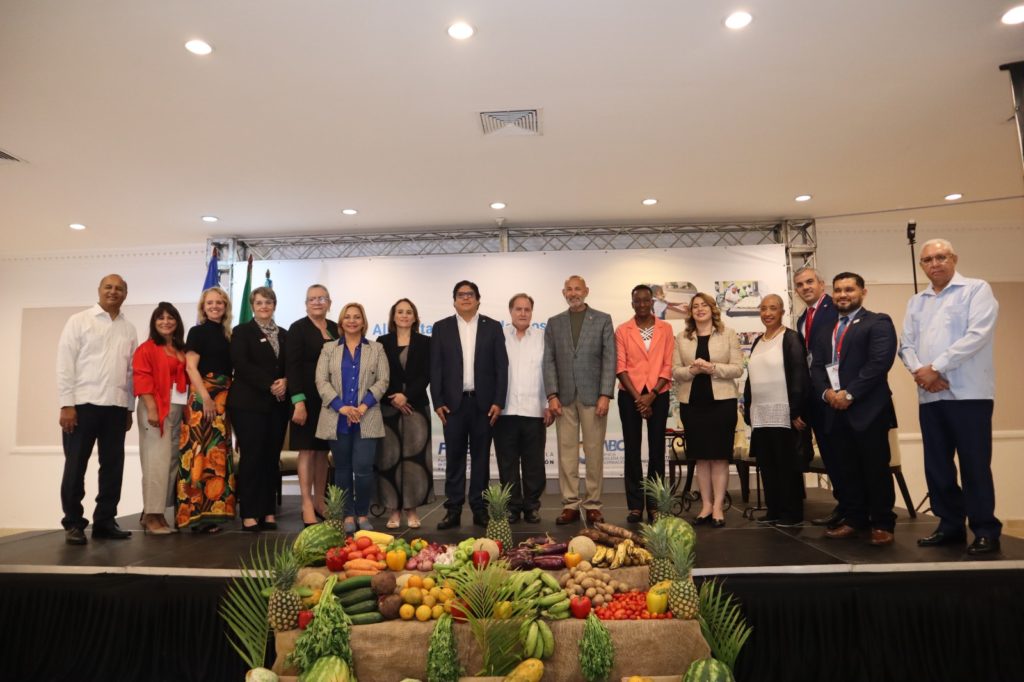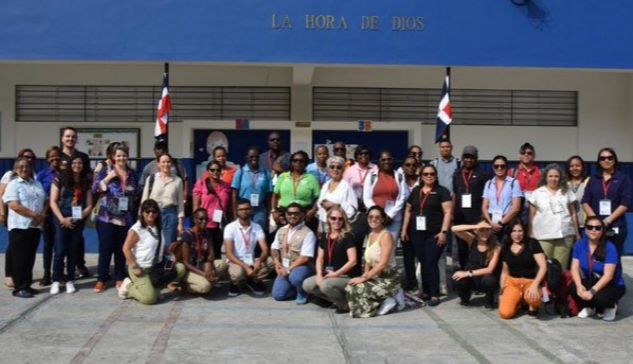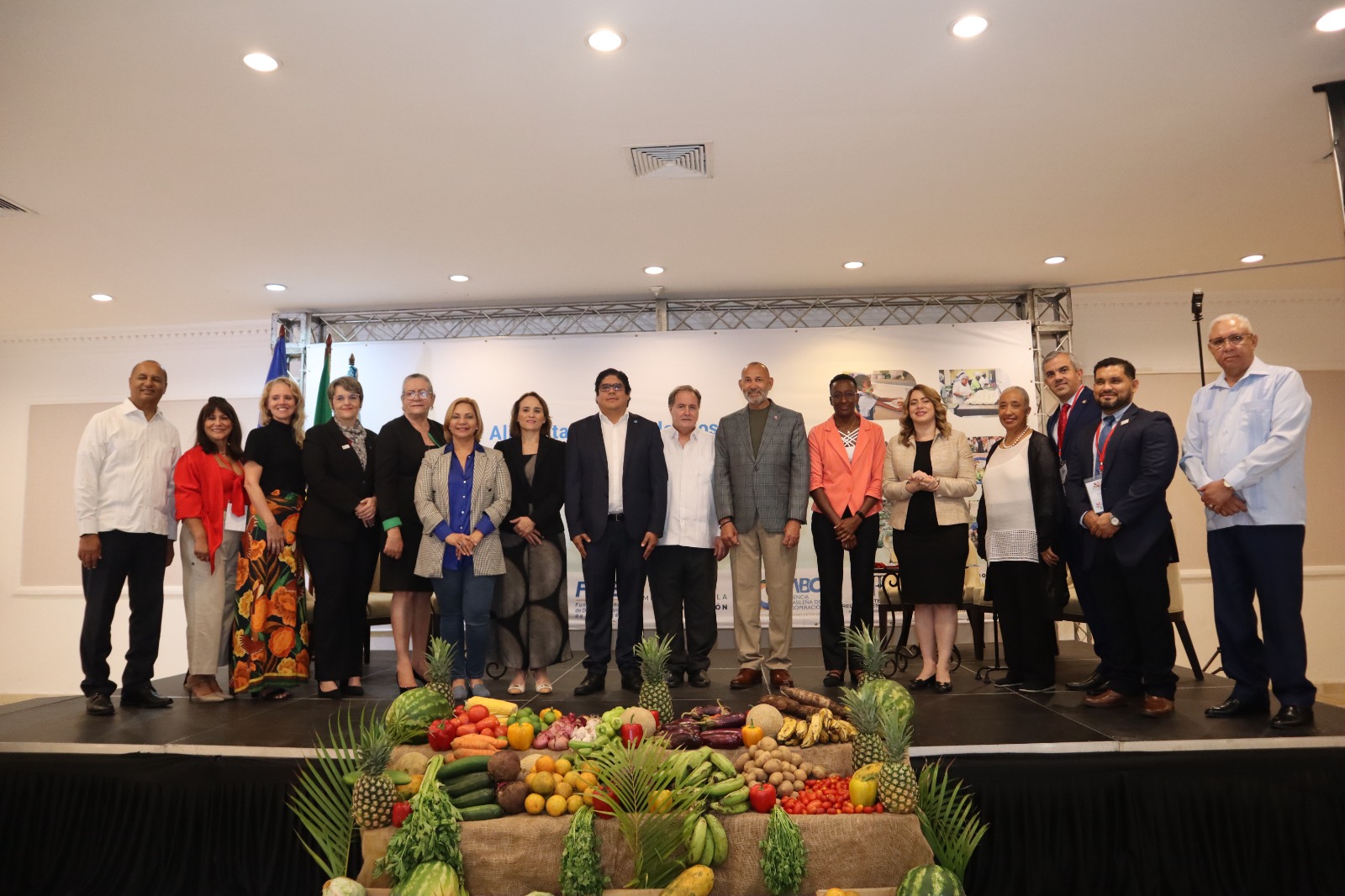International technical mission will exhaust its work schedule in the country from this Monday, March 13 to Friday, March 17
Santo Domingo. – An international delegation from 10 countries is visiting the Dominican Republic throughout this week with the purpose of learning about the implementation of the School Feeding Program executed by the National Institute for Student Welfare (INABIE) and conducting a course on the subject and exchanging experiences.
The action is carried out within the framework of the Brazil-FAO International Cooperation Program, through the Brazilian Cooperation Agency (ABC/MRE), the National Fund for the Educational Development (FNDE/MEC) and the Food and Agriculture Organization of the United Nations Organization (FAO), through the project “Consolidation of School Feeding Programs in Latin America and the Caribbean”.
The technical mission was received by the executive director of INABIE, Víctor Castro Izquierdo, the FAO representative in the Dominican Republic, Rodrigo Castañeda, the Brazilian ambassador in the Dominican Republic, Renan Barreto, Fernanda Pacobahyba, president of FNDE, and Najla Veloso , regional coordinator of the school feeding project of the Brazil-FAO Cooperation, in addition to other authorities at the Dominican Fiesta hotel located on Anacaona avenue in the National District.
The technical mission in the country is made up of managers of school feeding programs in the ministries of education, agriculture and health of ten countries, these are: Belize, Brazil, Bahamas, Grenada, Guyana, Jamaica, Saint Lucia, Saint Kitts and Nevis , Saint Vincent and the Grenadines and Trinidad and Tobago.
At the event, the Brazilian ambassador to the Dominican Republic, Renan Barreto, said that the Brazilian Government is very aware of the importance of the positive consequences that food generates in a country. And he reinforced the Brazilian commitment to the international cooperation and to the country. “This event is a moment of celebration for the seriousness of the entities that develop it and the commitment they have.”
For his part, Rodrigo Castañeda, FAO representative in the Dominican Republic, commented that it is extremely important to share experiences with the countries of the region. He thanked the support of the Brazilian Cooperation in school feeding and highlighted the role that the National Institute for Student Welfare (INABIE) has been developing in Dominican politics and the initiative of the bill that is now being processed in Congress.
“School feeding is a State commitment,” said Victor Castro, director of INABIE. During his participation in the workshop, the official commented that the coverage of the SFP will be expanded on Saturdays and Sundays. Castro also detailed the construction process of the School Feeding Law in the country and said that this is “the most important social program in the country,” which has an impact on more than 712,000 Dominican families and benefits 1.8 million students. “It is a transversal impact in the country,” he commented.
While Gloria Reyes, director of Supérate, indicated that the exchange of experiences, common challenges and good practices is key in the design of Public Social Protection Policies. “This meeting will allow us, that this cooperation, serve to motivate you and see in this model of Food and Nutrition Education, a development opportunity for our countries,” she said.
The president of the National Fund for the Development of Education (FNDE), Fernanda Pacobahyba, in her address, pointed out that the institution is dedicated to exchanging knowledge to support the consolidation of the school feeding policy together with the countries, with a view to improving actions and achieve better results. “We will continue supporting sustainable programs, developing technical capacities and exchanging experiences.”
Fernanda also commented on the Sustainable School Feeding Network (RAES), a network created by the Government of Brazil to deepen dialogue and knowledge sharing on school feeding in LAC. “We need to expand our alliances to provide better quality food in schools in our region.”
Najla Veloso, coordinator of the Consolidation of School Feeding Programmes in LAC project, detailed what sustainability is considered in this policy, being universal care for all enrolled students, the continuous and systematic offer of food on all school days , public purchases from family farming and food and nutrition education actions, among other topics
“We have managed to change the paradigm of school feeding in Latin America and the Caribbean, where a view of school feeding as a guideline of the human right to adequate food was consolidated, already thinking about the structuring and approval of legal frameworks,” he said. .

The mission
Throughout this week they will visit the educational centers La Hora de Dios in Santo Domingo Oeste and Mata Limón in Monte Plata with the guidance of INABIE, the managers and farmers involved.
The objective of the field visits is for the participants to follow the process of implementing the school feeding program in the country’s educational centers, in addition to learning about the reality and challenges of local family farming through a visit to an association of farmers. In this case, Villa Poppy Cooperative of Constanza Producers was selected.
In addition to the tours in educational centers, the technical mission will carry out in the country the second phase of the 2020 School Feeding Course entitled “School Feeding Programs and Food and Nutrition Education”. The first was developed from August 11 to October 7, 2021 and the face-to-face phase had not been possible due to the pandemic crisis that was experienced at that time.
In this second stage, the following topics will be discussed: importance of universal service for students enrolled in public schools, acquisition of food produced locally and preferably by family farmers and rural family entrepreneurs, inclusion of food and nutrition education in the teaching process and learning, among others.
This visit represents an opportunity for dialogue with the countries of the area, in reference to the implementation of Sustainable Schools in the Dominican Republic, a methodology developed by the Brazil-FAO International Cooperation in school feeding in different LAC countries. In addition, it has the firm objective of contributing to the strengthening of school feeding programs in the Caribbean as a strategy to face the growing trend of malnutrition in all its forms and guarantee the human right to food.
The opening ceremony of the event, the School Feeding Programs and Food and Nutrition Education course and its closing this Friday will take place at the aforementioned hotel.




